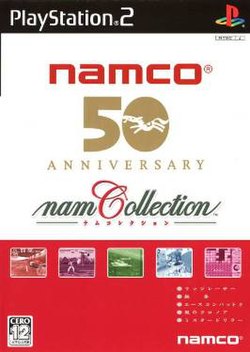| NamCollection | |
|---|---|
 | |
| Developer(s) | Namco |
| Publisher(s) | Namco |
| Platform(s) | PlayStation 2 |
| Release |
|
| Genre(s) | Various |
| Mode(s) | Single-player |
NamCollection [a] is a video game compilation released in July 2005 by Namco in Japan only to celebrate the company's 50th anniversary.
Contents
The compilation contains five ports of various PlayStation titles created by the company with added analog support and retexturing.